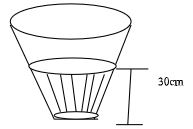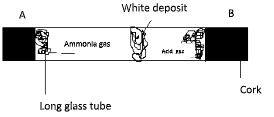QUESTIONS ;
-
- State and explain any 3 branches of physics.(3 marks)
- While stating an example in cach case, differentiate between a derived quantity and basic physical quantity. (4 marks)
- A sphere of diameter 6.0cm is moulded into a thin uniform wire of diameter 0.2mm. Calculate the length of the wire in metres. (Take -22/7) (4 marks)
-
- State and explain two factors affecting surface tension. (4 marks)
- Explain three differences between mass and weight. (3 marks)
-
- A brick 20cm long, 10cm wide and 5cm thick has a mass 500g.Determine
- Greatest pressure that can be exerted by the brick. (2 marks)
- Least pressure that can be exerted by the brick. (2 marks)
- Explain two properties of a brake fluid. (2 marks)
- The figure below shows a liquid in a pail if the liquid has a density of 1.20g/cm3.determine the pressure exerted at the bottom of the container by the liquid. (3 marks)
- A brick 20cm long, 10cm wide and 5cm thick has a mass 500g.Determine
-
- Differentiate between the Brownian motion and kinetic theory of matter. (1 mark)
- In the figure below, ammonia gas and an acid gas diffuse to form a white deposit on the walls of the glass tube. The deposit forms nearer end B.
- State which gas diffused faster. (1 mark
- Explain why the gas in (a) above diffused faster. (2 marks)
-
- Draw, show and explain features of a common thermometer. (5 marks)
- State 3 factors affecting thermal conductivity. (3 marks)
-
- State the laws of reflection. (2 marks)
- State two application of electrostatics. (2 marks)
- List 3 advantages of alkaline accumulators over lead acid accumulators. (3 marks)
- A battery arculated charge round a circuit for 1.5 minutes. If the current is held at 25 A, what quantity of charge passes through the wire. (3 marks)
-
- Explain the meaning of the following:
- Magnetic field- (2 marks)
- Magnetic lines of force-
- Describe three methods of demagnetizing a permanent magnet. (3 marks)
- Use the domain theory to explain the difference between magnetic and non-magnetic material. (2 marks)
- Explain the meaning of the following:
-
- Write the following to 2 significant figures.
7321769
0.0008996 - If an oil drop of diameter 0.5mm spreads on the surface of water to form an oil patch of diameter 0.2m.Estimate the thickness of the oil molecule. Write your answer to 3 significant figures. (4 marks)
- Write the following to 2 significant figures.
-
- Define moment and state its SI unit. (2 marks)
- A uniform metre rule pivoted at its centre is balanced by a force 4.8 N at 20cm mark and some other two forces F and 2.ON at the 66cm and 90cm marks respectively. Calculate F. (3 marks)
-
- Explain the meaning of "center of gravity" (1 mark)
- Using diagrams explain the three states of equilibrium. (3 marks)
MARKING SCHEME
-
- State and explain any 3 branches of physics.
(3 marks)
- )While stating an example in each case, differentiate between a derived quantity and basic physical quantity. (4 marks)
- Basic quantity is a quantity that is measured using an instrument and cannot be obtained from any other quantity e.g length, mass time,while a derived quantity is obtained by multiplication or division of basic physical quantity e.g volume,area, density.
- A sphere of diameter 6.0cm is moulded into a thin uniform wire of diameter 0.2mm. Calculate the length of the wire in metres. (Take л=22/7) (4 marks)
Volume of sphere T3=xx(3.0)
|=x(3.0)/(0.01)
=360000cm
=3600m
- State and explain any 3 branches of physics.
-
- State and explain two factors affecting surface tension.(4 marks)
- Impurities-Impurities reduces surface tension since they reduce cohesive forces between liquid molecules.
- Temperature-Temperature increase kinetic energy of molecules thus intermolecular distance is increased therefore decreasing surface tension.
- Explain three differences between mass and weight. (3 marks)
- State and explain two factors affecting surface tension.(4 marks)
-
- A brick 20cm long, 10cm wide and 5cm thick has a mass 500g.Determine
- Greatest pressure that can be exerted by the brick. (2 marks)
Weight of brick 500/1000 ×10
P=0.10x0.05=0.005m*
P=5/0.005=1000N/m2 - Least pressure that can be exerted by the brick. (2 marks)
P= 5/0.20×0.10=250N/m2
- Greatest pressure that can be exerted by the brick. (2 marks)
- Explain two properties of a brake fluid.(2 marks)
- Must be incompressible to ensure pressure exerted at one point is transmitted equally to all other parts in the liquid.
- Have low freezing point and high boiling tube
- Should not corrode the parts of the brake system.
- The figure below shows a liquid in a pail if the liquid has a density of 1.20g/cm3.determine the pressure exerted at the bottom of the container by the liquid.(3 marks)
1200 x 10 x 0.3
=3600 pa
- A brick 20cm long, 10cm wide and 5cm thick has a mass 500g.Determine
-
- Differentiate between the Brownian motion and kinetic theory of matter. (1 mark)
- Brownian motion is the constant random movement of liquid and gas particles i.e fluid particles while the kinetic theory involves motion of particles of solid, liquids and gases i.e motion in all states of matter.
- In the figure below, ammonia gas and an acid gas diffuse to form a white deposit on the walls of the glass tube. The deposit forms nearer end B
.
- State which gas diffused faster.
Ammonia gas(1 mark) - Explain why the gas in (a) above diffused faster. (2 marks)
- Ammonia gas is less dense as compared to acid gas therefore can diffuse faster than acid gas
- State which gas diffused faster.
- Differentiate between the Brownian motion and kinetic theory of matter. (1 mark)
-
- Draw, show and explain features of a common thermometer.(5 marks)
Bulb-Carries the liquid in the thermometer
Capillary bore-Liquid expands and contracts along capillary bore.
Glass stem-Sorrounds the capillary bore and serves as a magnifying glass. - State 3 factors affecting thermal conductivity. (3 marks)
- Temperature difference between the ends of the conductor.
- The length of the conductor.
- The cross section area of the conductor.
- The nature of the material.
- Draw, show and explain features of a common thermometer.(5 marks)
-
- State the laws of reflection. (2 marks)
- The angle of reflection is equal to the angle of incidence at a point of contact.
- the incidence ray the reflected ray and the normal at the point of incidence all lie on the same plane.
- State two application of electrostatics.(2 marks)
- Electrostatic precipitator
- Spray painting
- Photocopier
- List 3 advantages of Alkaline accumulators over lead-acid accumulators.(3 marks)
- Large currents can be drawn from them.
- They can be kept in a discharged condition for a very long time before the cells are ruined.
- They require very little attention to maintain.
- They are lighter (more portable) than the lead-acid accumulator.
- A battery arculated charge round a circuit for 1.5 minutes. If the current is held at 25 A, what quantity of charge passes through the wire. (3 marks)
=Q/T
5.5=Q/1.5×60v
2.5×1.5×60=QV
=225 coulombsv
- State the laws of reflection. (2 marks)
-
- Explain the meaning of the following: (2 marks)
- Magnetic field-
Region or space where magnetic influence is felt. - Magnetic lines of force-
Lines drawn to show the magnetic influence.
- Magnetic field-
- Describe three methods of demagnetizing a permanent magnet. (3 marks)
- Hammering
- Electric method
- Heating
(mark with explanation)
- Use the domain theory to explain the difference between magnetic and non-magnetic material. (2 marks
- A magnetic material is in the saturated state since the dipoles have aligned themselves facing same direction in a non magnetic material the dipoles face different directions therefore in a state of un magnetized.
- Explain the meaning of the following: (2 marks)
-
- Write the following to 2 significant figures.
- 7321769
7300000 - 0.0008996
0.0009000
- 7321769
- If an oil drop of diameter 0.5mm spreads on the surface of water to form an oil patch of diameter 0.2m.Estimate the thickness of the oil molecule. Write your answer to 3 significant figures. (4 marks)
πr=πR'h
(0.5)=x (200)h/2
x0.25)nh/100
H=1.067x10 mm 1.07x10 mm
- Write the following to 2 significant figures.
-
- Define moment and state its SI unit. (2 marks)
- It's the product of force and perpendicular distance between the point of support and the line of action of force.
- SI unit is (Nm) Newton - metre
- A uniform metre rule pivoted at its centre is balanced by a force 4.8 N at 20cm mark and some other two forces F and 2.ON at the 66cm and 90cm marks respectively. Calculate F. (3 marks)
Clockwise moments-anticlockwise moments
(FX0.16)+(2.0x0.4)=(4.8x0.3)
0.16F+0.8=1.44
0.16F 0.64
F=0.64/0.16
F=4.ON
- Define moment and state its SI unit. (2 marks)
-
- Explain the meaning of "center of gravity" (1 mark)
- This is the point of application of the resultant force due to earths attraction on the body.
- Using diagrams explain the three states of equilibrium. (3 marks)
Stable stability-When cone is tilted it returns back to its original position
Unstable stability-When cone is tilted it acquires a new position different from original.
Neutral stability-When cone is tilted it does not change the original position.
- Explain the meaning of "center of gravity" (1 mark)
Join our whatsapp group for latest updates
Tap Here to Download for 50/-
Get on WhatsApp for 50/-
Download Physics Questions and Answers - Form 2 Term 2 Opener Exams 2023.
Tap Here to Download for 50/-
Get on WhatsApp for 50/-
Why download?
- ✔ To read offline at any time.
- ✔ To Print at your convenience
- ✔ Share Easily with Friends / Students





